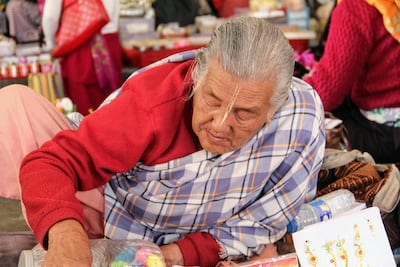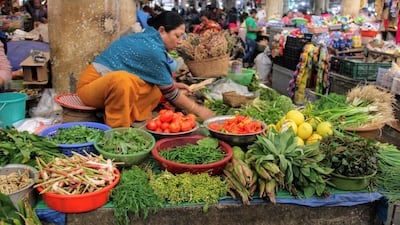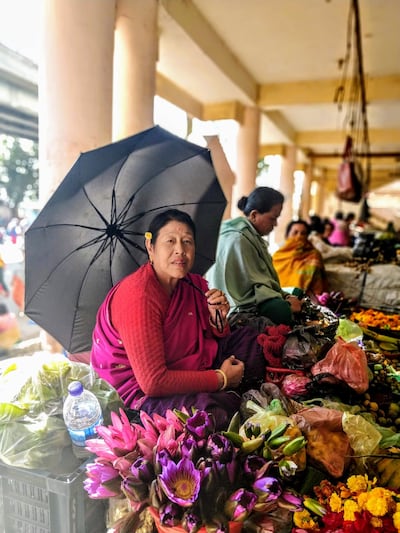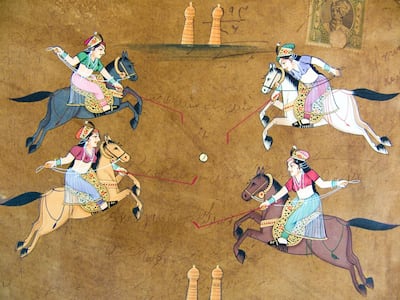Women of all ages, dressed in traditional phaneks (sarongs) and shawls, their foreheads streaked with sandalwood paste, sit cross-legged on elevated platforms in front of their wares, some on their mobile phones, others writing in notebooks propped on their laps.
I am at the Nupi Keithel Market (the women's market popularly known as Ima Market, which translates to Mothers' Market) in Imphal, the capital of hilly Manipur in India. A sensory overload of smell, sound and colour, the market is run entirely by women and is one of Asia's largest and oldest. It is housed over three, large, two-storey buildings with typical tapered Manipuri roofs, and features different sections for fruits and vegetables, fish and meat, textiles, kitchen implements, religious paraphernalia, baskets and woven products.
Manipur was once a prosperous Tibeto-Burman kingdom that became part of India in 1949, but suffered for decades due to separatist unrest. In recent times, with the return of peace, it has opened up in a small way to tourism. I am exploring the state on a trip organised by Julie Kagti of Curtain Call Adventures, which helps travellers discover India's relatively unexplored north-east. Hailing from Assam, Kagti is a textile designer.
The women’s market has been in existence since the 16th century, when Manipur had a system of military conscription called lallup. Men often had to go away for long periods, to fight in wars with neighbouring kingdoms, Burma and Britain, and the women were left to support the family, working at home, in the paddy fields or selling goods in the market. This left women controlling Manipur’s cottage and retail industries.
Today, more than 3,500 Meitei – the majority ethnic group in Manipur – women manage the stalls here. I trawl through the market, making eye contact with friendly shop owners, who beckon me over, asking me where I am from, and pose spontaneously for photographs when I train my camera on them, adjusting their shawls or flicking back their hair with a smile.
"Manipur has always had a history of feisty women who have resisted British rule and oppression," says Rajib, my local guide. The first nupi lan, or women's war, was fought in 1904 against the British, who had won the Anglo-Manipuri War of 1891, and were forcing the Manipuris to rebuild the British Residency, which had been set on fire. The next uprising was against a trade policy in the late 1930s, when Marwari businessmen, from the Marwar region of Rajasthan, with the support of the British, exported rice from Manipur, leading to an artificial food shortage in the state. The women organised protests and fought vehemently for their rights.

In 2004, the state came under the spotlight when 12 women famously participated in a protest against the 17th Assam rifles and their involvement in the Thangjam Manorama rape case and murder. The forces eventually had to leave the Kangla Fort in Imphal and hand it back to the people.
The Ima Market started off as an open-air trading place for the palace in Kangla Fort in the 1700s, when business was mostly done by barter. It was later housed in rustic sheds, while its modern avatar is located in concrete buildings. It has always been a retail hub and meeting ground for the women of the city, operating on unwritten rules and administered by a council of local women.
Only married women can work here – stalls are transferred from mother to daughter-in-law. Many of the shop owners I see are senior citizens. Many have taken advantage of micro-finance schemes in recent times, and there is also a union that they can borrow money from to purchase goods.
There is an obvious camaraderie between the women – some sit with their friends shelling peas, others play games of Ludo or cards, some stitch or knit, while others write industriously in their account books as they wait for customers. One corner of the space doubles up as a food court where women fry fritters dipped in gram flour.
Over the next few days, I discover that the Ima Market is not the only place where women play a dominant role in Manipur. The state is also famous for sportswomen such as Mary Kom, the Olympic boxing champion, and Mirabai Chanu, the weightlifter. I meet L Somi Roy, a film curator who has worked with film festivals and museums in the US, at his home in Imphal, which is furnished with the artworks and books of his famous mother, a writer and artist from the Manipur royal family.
Roy has been helping resurrect, with American expertise, the game of modern polo, which has its origins in Manipur. He is also taking steps to conserve the endangered Manipuri Pony. "I used to live in New York, and when I started visiting Imphal again after a long gap, I saw the ponies on the streets, eating rubbish and plastic."
Once, this animal was considered sacred and had its own deity, but over the years lost its habitat due to encroachment of marshy areas and wetlands. "So when I returned to Manipur in 2016, I formed my company, Huntre! Equine, and took steps to generate awareness and have the pony declared a 'protected breed'.
I also decided to create an international women's polo tournament with my partner Ed Armstrong, and train them. I am not a messiah or do-gooder, women have always played polo in Manipur. Here, it's not an elitist game like elsewhere. What we did was bring a team from the US to play with them and coach them."
Roy and Armstrong began inviting teams from the United States Polo Association, Hurlingham Polo Association in England and others, to play with Manipuri women. The first international tournament the Manipur women's teams played was in Imphal and Jaipur in 2016, against a visiting US team. The recently concluded season had teams from as far as Kenya and Argentina participating.
Today, three-quarters of Indian women polo players are from Manipur. A 2018 documentary, Daughters of the Polo God, made by Roy and Armstrong's partner, filmmaker Roopa Barua, captures the spirit of Manipuri women perfectly. In a country where patriarchy is deep-seated, the women here have long tried to forge a different path.



